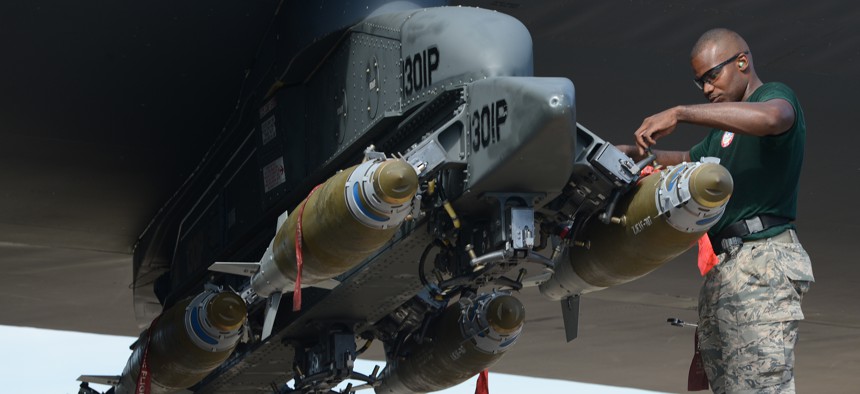
Staff Sgt. Stefano Cothran, a 2nd Aircraft Maintenance Squadron weapons load team member, secures a GBU-38 Joint Direct Attack Munition to a pylon during the 2014 Global Strike Challenge on Barksdale Air Force Base, La. in 2014. Senior Airman Benjamin Gonsier/Air Force file photo
Pentagon Fronts Bomb Buys For Allies Fighting ISIS
A special budget account is being used to boost weapons production ahead of allies' formal orders.
The Pentagon is buying bombs for allies to drop on Islamic State militants, essentially fronting the cash to speed up weapons deliveries, top military officials said.
The money comes out of the Special Defense Acquisition Fund, which is used to purchase arms for foreign allies in anticipation of formal orders, allowing factories to accelerate production and cut months or even years off the wait.
“Its purpose is to let the military department buy in advance of [formal arms sales requests] so we can get started early on long-lead-time items, so we can stockpile things we know there’s going to be an immediate rush or demand,” Ann Cataldo, deputy assistant Army secretary for defense exports and cooperation, said Tuesday at the Association of the U.S. Army’s annual convention in Washington.
Earlier this year, Defense Secretary Ash Carter revealed that the two-year bombing campaign against ISIS has depleted the U.S. military’s stores of bombs and missiles. In May, Defense One learned the military was raiding its bomb stockpiles elsewhere in the world to keep the campaign supplied.
In 2015, the Pentagon used $45 million from the fund. This year, “we almost doubled that amount,” Cataldo said. In addition to bombs and missiles, the money has been used to buy aircraft and combat vehicles parts, vaccines, and night-vision goggles.
“We have been able to use the funds in there…and we’ve been able to prime the pump on quite a few urgent need items,” said Vice Adm. Joseph Rixey, director of the Defense Security Cooperation Agency, the Pentagon office that oversees foreign arms sales and controls the special budget account.
Congress last year increased the amount of money allowed in the account from $100 million to nearly $1 billion. The military services, combatant commands, Joint Staff, and State Department must bless the sales that are started in advance of a foreign requests, Rixey said.
By using the special account, “we’re able to attack that issue associated with munitions so that…we quit shooting behind the duck when it comes to supporting” such foreign sales,” Rixey said.







